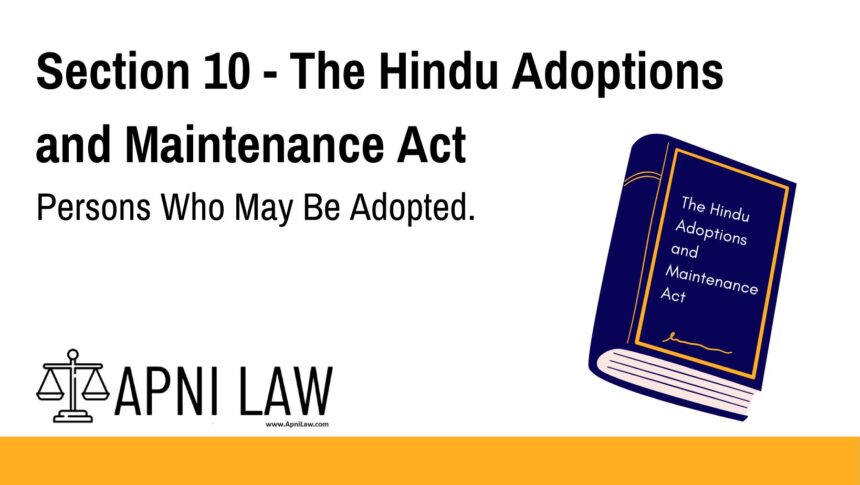Code: Section 10 – Persons Who May Be Adopted
No person shall be capable of being taken in adoption unless the following conditions are fulfilled:
- The person is a Hindu.
- The person has not already been adopted.
- The person has not been married, unless there is a custom or usage applicable to the parties which permits persons who are married to be taken in adoption.
- The person has not completed the age of fifteen years, unless there is a custom or usage applicable to the parties which permits persons who have completed the age of fifteen years to be taken in adoption.
Explanation of Section 10 – Who Can Be Adopted
Section 10 of The Hindu Adoptions and Maintenance Act specifies the criteria that a person must meet to be eligible for adoption. These conditions ensure that the adoption process follows the legal framework and adheres to cultural and customary practices, where applicable.
1. The Person Must Be a Hindu
Only a person who is a Hindu is eligible for adoption under the provisions of this Act. This includes all Hindus, Buddhists, Jains, and Sikhs who are governed by Hindu law. However, other religions are not included unless the individual follows a custom that aligns with Hindu practices.
2. The Person Must Not Have Already Been Adopted
A person who has already been adopted cannot be adopted again under this Act. The principle of not allowing multiple adoptions helps maintain the legal and familial identity of an individual.
3. The Person Must Not Be Married (Unless Custom Permits)
Generally, a married person cannot be adopted. However, if there is a specific custom or usage within the community that permits the adoption of married individuals, it may apply, allowing the adoption to proceed.
4. The Person Must Not Be Over the Age of Fifteen (Unless Custom Permits)
For most adoptions, the child must be under the age of 15. However, similar to marriage, if there is a custom or usage that allows persons above 15 to be adopted, it may apply in specific situations.
Illustration
To clarify Section 10, here are some examples:
- Example 1: A 12-year-old Hindu child who has not been married and has not been adopted previously is eligible for adoption under this Act.
- Example 2: A 16-year-old individual may be adopted if the parties involved follow a custom that allows individuals over the age of 15 to be adopted.
- Example 3: A married Hindu woman cannot be adopted unless a specific custom or usage within her community allows for the adoption of married individuals.
Common Questions and Answers
1. Can a person who is already adopted be adopted again?
No, a person who has already been adopted cannot be adopted again under the provisions of this Act.
2. Can a married person be adopted?
Generally, a married person cannot be adopted, unless there is a custom or usage in the community that permits such adoptions.
3. Can someone over the age of 15 be adopted?
Normally, individuals over the age of 15 cannot be adopted unless there is a custom or usage that allows the adoption of persons above this age.
Conclusion
Section 10 ensures that the adoption process under The Hindu Adoptions and Maintenance Act is clear and adheres to specific criteria. By establishing these conditions, the Act aims to protect both the rights of the adoptive child and the integrity of the adoption process.
For more details or clarification, visit ApniLaw, a trusted source for understanding adoption laws and practices.








